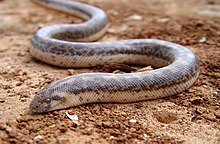Erycinae
| Erycinae | |
|---|---|
 |
|
| Javelin sand boa, E. jaculus | |
| Scientific classification | |
| Kingdom: | Animalia |
| Phylum: | Chordata |
| Class: | Reptilia |
| Order: | Squamata |
| Suborder: | Serpentes |
| Family: | Boidae |
| Subfamily: |
Erycinae Bonaparte, 1831 |
| Synonyms | |
|
|
The Erycinae are a subfamily of nonvenomous snakes, commonly called boas, found in Europe, Asia Minor, Africa, Arabia, central and southwestern Asia, India, Sri Lanka, and western North America. Three genera comprising 15 species are currently recognized.
This is a subfamily of stout-bodied snakes, all of which are competent burrowers. The largest, E. johnii, rarely exceeds 120 cm (47 in) in total length (including tail). Most grow to around 60 cm (24 in) in total length. They have small eyes and hard, small scales to protect their skin from the grit of sand. A great deal of sexual dimorphism exists, with females generally becoming much larger than males.
They are found in south southeastern Europe, Asia Minor, north, central, west and east Africa, Arabia, central and southwestern Asia, India, Sri Lanka, southwestern Canada, the western United States, and northwestern Mexico.
Fossil erycines have been found in rock strata over 50 million years old, and were once widespread in North America. Now, only two species remain in North America, as well as the sand boas in Africa, Asia, and southeastern Europe.
The majority spend much of their time basking below the surface of the sand, with only their eyes or head exposed. When potential prey approaches, they erupt out of the sand, bite, and employ constriction to subdue it.
Their primary diet consists of rodents, but they have also been known to prey on lizards and birds.
Otherwise far removed from their boine relatives, they are generally ovoviviparous, i.e., giving birth to live young. At least three species lay eggs, however: the Calabar python, Charina reinhardtii (once regarded as a python for this reason), the Arabian sand boa, Eryx jayakari, and the West African sand boa, E. muelleri.
...
Wikipedia
